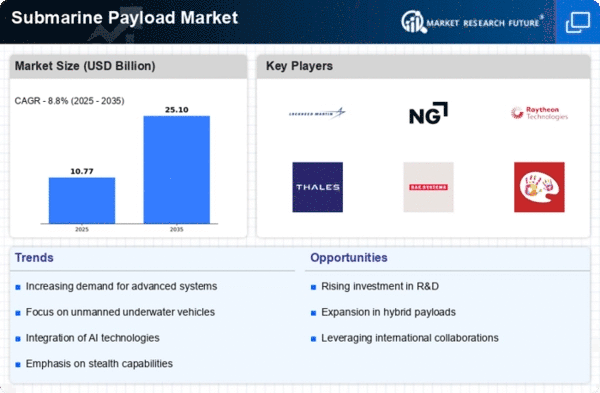Market Analysis
In-depth Analysis of Submarine Payload Market Industry Landscape
Several market factors contribute to shaping the dynamics of the Submarine Payload market, reflecting the complex interplay of technological, geopolitical, and strategic considerations. One pivotal factor is the increasing global emphasis on maritime security, driving nations to invest in advanced submarine capabilities. As countries seek to protect their maritime interests and maintain a competitive edge in undersea warfare, the demand for sophisticated submarine payloads rises. The continual evolution of naval strategies and the need to counter emerging threats contribute to the demand for innovative payload solutions that enhance the overall effectiveness of submarines.
Geopolitical considerations and regional tensions are influential factors in the Submarine Payload market. Nations with strategic maritime interests invest significantly in enhancing their naval capabilities, including submarine fleets and associated payloads. Geopolitical dynamics and territorial disputes drive the demand for advanced submarine payload systems, as countries seek to safeguard maritime borders, project power, and establish dominance in contested waters. The geopolitical landscape shapes procurement decisions and influences the overall demand for submarine payload technologies.
Technological innovation and advancements are critical market factors that drive the Submarine Payload sector. The evolution of sensor technologies, communication systems, and unmanned underwater vehicles (UUVs) contributes to the development of sophisticated submarine payloads. Manufacturers focus on introducing cutting-edge technologies to enhance the detection capabilities, stealth features, and overall mission flexibility of submarine payloads. Technological advancements play a pivotal role in addressing the complex challenges of undersea warfare and meeting the evolving requirements of modern naval forces.
Naval modernization programs and fleet expansion initiatives contribute significantly to market factors in the Submarine Payload sector. As nations prioritize the modernization of their naval capabilities, including the replacement or upgrade of aging submarine fleets, the demand for advanced payload systems grows. Manufacturers that can align their offerings with the requirements of naval modernization programs position themselves favorably, capitalizing on the opportunities presented by the continual evolution of submarine fleets.
The increasing prevalence of asymmetric threats and unconventional challenges in maritime environments is a significant factor influencing the Submarine Payload market. Non-state actors, rogue nations, and unconventional threats pose unique challenges to maritime security. The demand for specialized submarine payloads designed for countermeasures, mine countermeasures, and intelligence, surveillance, and reconnaissance (ISR) rises in response to these unconventional threats. Adaptability and versatility in submarine payload capabilities become critical factors in addressing a spectrum of potential challenges.
International collaborations and partnerships play a crucial role in the Submarine Payload market. Given the complexity and cost of developing advanced submarine payloads, nations often engage in joint ventures, collaborative research, and technology-sharing agreements. These collaborations contribute to the pool of resources, expertise, and technological advancements in submarine payload systems. Shared development efforts foster interoperability among allied navies, addressing mutual security concerns and influencing market dynamics.
Budget considerations and fiscal constraints are essential market factors influencing the Submarine Payload sector. Governments allocate defense budgets for naval programs, including submarine acquisitions and associated payloads. Manufacturers that can provide cost-effective solutions without compromising performance gain a competitive edge. The balance between technological sophistication and budgetary constraints shapes procurement decisions, influencing the adoption of specific submarine payload systems.
The role of underwater communication technologies is a significant market factor. With the increasing need for submarines to operate collaboratively and share critical information in real-time, advanced underwater communication systems become integral components of submarine payloads. Manufacturers focusing on developing reliable and secure communication technologies for undersea operations address a crucial market factor, contributing to the effectiveness of naval forces in coordinated submarine missions.
Environmental sustainability considerations are emerging as market factors in the Submarine Payload sector. Manufacturers are exploring eco-friendly materials and manufacturing processes to align with global efforts toward sustainability. The environmental impact of defense technologies, including submarine payloads, is becoming a consideration in procurement decisions. Sustainable practices and environmentally conscious approaches contribute to market factors influencing the development and adoption of submarine payload systems.


















Leave a Comment